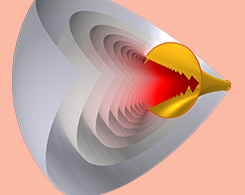Latest Posts

Studying Shock Wave Phenomena with a Shock Tube Application
Shock waves used to be a theoretical problem only. Then, shock tubes enabled experimentation, but it was costly and inefficient. Enter numerical modeling applications.

Keynote Video: Designing Improved Heart Pumps with Simulation
Abbott Laboratories designed “the most complex machine ever implanted into a human being” — an LVAD for heart failure patients — using multiphysics modeling. The result? Saved lives.

Simulating Nonlinear Sound Propagation in an Acoustic Horn
The Westervelt model enables you to perform complex acoustics analyses, such as modeling the propagation of nonlinear acoustic waves generated by an exponential horn.

Happy Birthday, Ellen Swallow Richards
Ellen Swallow Richards, an American chemical engineer, improved sanitary engineering and was the first woman to attend, graduate from, and teach at the Massachusetts Institute of Technology.

FEM vs. FVM
Finite element methods, finite volume methods, or a hybrid approach: Which is the best choice for CFD? It depends on the fluid flow problem you’re trying to solve.

Why Participate in a Panel Discussion at the COMSOL Conference?
We talk to moderators and panelists from past COMSOL conferences to find out how the industry-specific panel discussions “add a new dimension to the conference!”

Happy Birthday, Sir Horace Lamb
Sir Horace Lamb, a prolific applied mathematician and leader in hydrodynamics research, was one of the first four professors at the University of Adelaide in Australia and was knighted in 1931.

Keynote Video: Optimizing Test Connector Designs with RF Simulation
At Signal Microwave, RF simulation is used to optimize test connector designs quickly and efficiently, giving the organization a unique advantage when it comes to being a small business.
